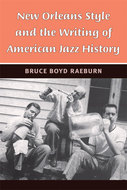 Bruce Boyd Raeburn. New Orleans Style and the Writing of American Jazz History. Ann Arbor: The University of Michigan Press, 2009. ISBN 0-472-03321-2. 342 pages.
Bruce Boyd Raeburn. New Orleans Style and the Writing of American Jazz History. Ann Arbor: The University of Michigan Press, 2009. ISBN 0-472-03321-2. 342 pages.
For a relatively young art form, jazz has spawned an immense and remarkably diverse supporting literature. In the mid-1930s, books delineating its origins, founders, foremost practitioners, and stylistic attributes began cropping up. Documenting the already 40-year old music, these books appeared first in France and then America. Amid the growing body of literature certain works have assumed great importance in influencing how later scholars approached jazz. Perhaps no other text exerted as profound an impact on jazz discourse, particularly it’s origin in and subsequent diffusion from New Orleans, as Jazzmen, a collection of articles edited by Charles Edward Smith and Frederic Ramsey, Jr. (Harcourt Brace Jovanovich, Inc., 1939). The text provided the catalyst for a trend in subsequent histories whereupon swing bands, bebop, free, fusion, and still more styles were woven into the historical narratives as extensions of the original style; evolution through an accumulation of artistic innovations. The idea of progress was anathema to Smith, Ramsey, and many of the record collectors and discographers who had been the earliest advocates of jazz as a distinct art form. For this group of cognoscenti hot music was not just the leaping off point for the jazz art, it was the art itself.
In his book New Orleans Style and the Writing of American Jazz History, Bruce Boyd Raeburn, the Curator of the Hogan Jazz Archive at Tulane University in New Orleans, explores the historiography of jazz from the pre-history writings, to the legacy of Jazzmen and other works that argue the primacy of New Orleans and the purity of New Orleans-style jazz, to the purist vs. modernist battles of the 1940s. His aim in exploring the history of jazz histories, at least in part, is “as an appeal for renewed scholarly interest in New Orleans jazz, conceived broadly as a community-based continuum in which many types of jazz coexist, as opposed to an ‘official’ jazz canon based on histories celebrating progressive stylistic evolution” (pg. 3). Deconstructing the “official history” of jazz with its focus on New Orleans as little more than jazz’s birthplace, the author attempts to liberate New Orleans-style jazz from its obligation to the evolution narrative. Louis Armstrong and Sidney Bechet, after all, were versatile, searching, relevant artists throughout their long careers, most of which occurred after they moved on from New Orleans. Jazz histories that fail to mention either of these giants after their first couple of chapters, are doing Armstrong, Bechet, New Orleans, and the readers a great disservice.
Raeburn demonstrates how the “official” history of jazz was preceded by “a rather homespun pursuit of knowledge, peripheral to the academy” by record collectors gathering and digesting the content of jazz records. First came criticism, then, with the help of discographies to illuminate the dark corners of an already vast body of sources, collectors refined their jazz classifications of hot, sweet, corny, and non-jazz into a hierarchy. When New Orleans was posited as the birthplace for the most primitive and pure group of records, collectors had the starting point on which to hang an already highly nuanced assessment of the recorded literature. The first of the American jazz histories followed in the late 1930s. All of this categorizing occurred within the collector communities with scarce input from the actual musicians who made the records. Raeburn states “the idea that one kind of jazz might be considered more authentic than another did not exist among New Orleans musicians when the idiom was first coalescing, in the years from 1896-1917.” A fetish for records, in effect, bestowed primacy upon these objects as historical documents, and the data they held sometimes rivaled the live performances of the artists themselves for authenticity. The discovery of Bunk Johnson, an unknown outside New Orleans, who, like a fly in amber, was believed to provide an uncorrupted link to the past by the authors of Jazzmen, was upheld as a player of jazz in its purist state.
Reading this monograph,one longs for a companion reader or appendix with complete texts of some of the cited sources. Raeburn has dug deep for articles, both arcane and obvious, to tell the story and make his argument. References to obscure, early writings on jazz and jazz musicians, particularly pieces by Charles Edward Smith in 1930s periodicals such as Symposium, The Daily Worker, and Esquire, lead to fascinating discussions grounded in a literature which has mostly never been reprinted. Perhaps a future project for a scholar of Raeburn’s talents would be an annotated collection of source readings on early jazz including the full texts of Smith’s pre-Jazzmen writings.
One regrets that in a study of this kind there are no photographs. Since the subject is not the musicians or the music itself, but rather how the origins and essentials of jazz were argued and written about, pictorial representation of the scholars and record collectors central to the process would have been a welcome touch. It is rare that figures such as Smith, Rudi Blesh, and Charles Delaunay get their due as biographical subjects beyond their views on jazz, so it seems a missed opportunity that the book, with the exception of the cover photograph (also printed opposite the title page), is not better illustrated. We do not need another reproduction of the old, grainy Buddy Bolden band photo, but how about showing the aforementioned collectors, images of Bunk Johnson with his collector community advocates, or even Nat Shilkret, a bandleader who, as Raeburn relates, served as A&R man for Victor and helped important records by King Oliver, Duke Ellington, and Jelly Roll Morton get made. Raeburn’s work presented an ideal opportunity to show what these scholars, discographers, executives, educators, and record collectors looked like. To his credit, he provides birth and death years, places of origins, colorful anecdotes on some of the subjects’ educational backgrounds, and, in the case of the collectors, how they came to that occupation.
As a study of how jazz histories were written and purist notions were theoretically codified, Raeburn’s book is superlative. He demonstrates how concepts arose, developed, and matured through the fire of dissent and compromise. One weakness of the book is that the voices of the critics and historians drown out those of the creators of the music. Most of the important autobiographies of jazz musicians (Louis Armstrong’s My Life in New Orleans, Garvin Bushell, Warren Baby Dodds, etc.) appeared after the jazz history debates of the 1940s had largely cooled and a linear, official narrative was firmly installed. Raeburn introduces guitarist Eddie Condon as a hot music partisan in the late 1930s, though his thoughts on the degeneration of the relationship between jazz purists and modernists that came later are not recorded. Armstrong’s first autobiography, Swing That Music, published in 1936, is mentioned only in passing. The relative absence of the voices of those who play jazz has the critics completely controlling the dialogue through their access to print media. An important exception is Jelly Roll Morton’s series of interviews with Alan Lomax. Raeburn handles the role of these crucial interviews by relating how this colorful figure entered the fray, appearing in Washington, D.C. and offering to tell his story to the Library of Congress. This depiction of an artist asserting his authority as a creator of the music in order to set the record straight is related with charm befitting the great pianist and was a needed departure from the activities and voices of Smith, Rudi Blesh, or Barry Ulanov. The author also ably attends the fact that the main target of the purists’s rancor, Metronome columnist and modernist advocate Leonard Feather, was a highly capable jazz musician ably.
The war between the purist camp and the progressives, which Raeburn illustrates with copious quotations from speeches and articles – many dripping with invective and surprisingly personal attacks – was lost for the “moldy figs” before it really started. Articulating a position with New Orleans Style as orthodox jazz, rendered too many artistic choices heretical. Even the collectors’ heroes like Sidney Bechet found themselves negotiating the double-edged New Orleans Revival, enjoying the benefit of publicity and attention afforded an original jazzman, with expectations exerting pressures on the music they played. The mantel of authenticity that was bestowed on New Orleaneans of a certain generation was a burden that other jazz creators were not expected to bear. Consequently, the progressive’s definition of jazz – embracing a multiplicity of jazz utterances and directions – had the purists fighting on too many fronts even before bebop emerged. This war of words had some of the best minds and advocates for jazz spinning their wheels in fruitless arguments with the other camp rather than improving their ideas.
It is obvious when reading New Orleans Style and the Writing of American Jazz History that Raeburn has an enviable mastery over his material. It is, therefore, difficult to suppose a criticism of this cogently argued text, which causes the reader to re-evaluate so many assumptions, might improve it or expose any serious fault. Other than perhaps the overuse of a few pet phrases like “catholic tastes,” Raeburn’s text is at the least effectively rendered, though it would be no stretch to declare it eloquently argued. It is an essential work for every serious jazz scholar both for its value as a reference work and illuminating exploration of jazz historiography.
--Jeff McMillan



